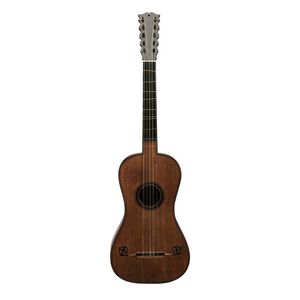Claude Aubert's 10-string French Guitar (1770)
You must be a subscriber, and be logged in to view price and dealer details.
Subscribe Now to view actual auction price for this item
When you subscribe, you have the option of setting the currency in which to display prices to $Au, $US, $NZ or Stg.
- Circa - A Latin term meaning 'about', often used in the antique trade to give an approximate date for the piece, usually considered to be five years on either side of the circa year. Thus, circa 1900 means the piece was made about 1900, probably between 1895 and 1905. The expression is sometimes abbreviated to c.1900.
- Ebony - Ebony is a close grained timber, black in colour. It has a fine texture which can be polished to a high gloss, making it suitable for venereering, inlay and stringing and its use as solid timber is resticted to small decorative items and ornamental decoration, such as chess pieces and musical instrument parts. The term "ebonised" means "faux ebony", timber that has been darkened during the polishing process to resemble ebony.
- Verso - Verso is the "back" side of a sheet of paper, art work, coin or medal. The front side is "recto".
This item has been included into following indexes:
Visually similar items

Three tortoiseshell and pique hair pins

Australian sterling silver 'Melbourne Amateur Regatta' beaker with a gilt wash interior, inscribed with the coat of arms of the city of Melbourne 'Vires Acquirit Eundo' to one side & to the other 'Melbourne Amateur Regatta Estab. 1903 1912 Maiden Eights wo

Large Sevres style charger with centre panel depicting lovers in the landscape approached by adjourning Putti, signed Cottinet, diameter 35 cm approx

A Salvatore Ferragamo Liny handbag, Presented as a Salvatore Ferragamo 'Liny' shoulder bag in the colour Macaron x rouge noir in calf leather. Style 21 F019/03 Pid0617440. Dimensions W x H x gusset (W) 25 cm x 27 cm x 16 cm, shoulder 46 cm. Satin lining, b
